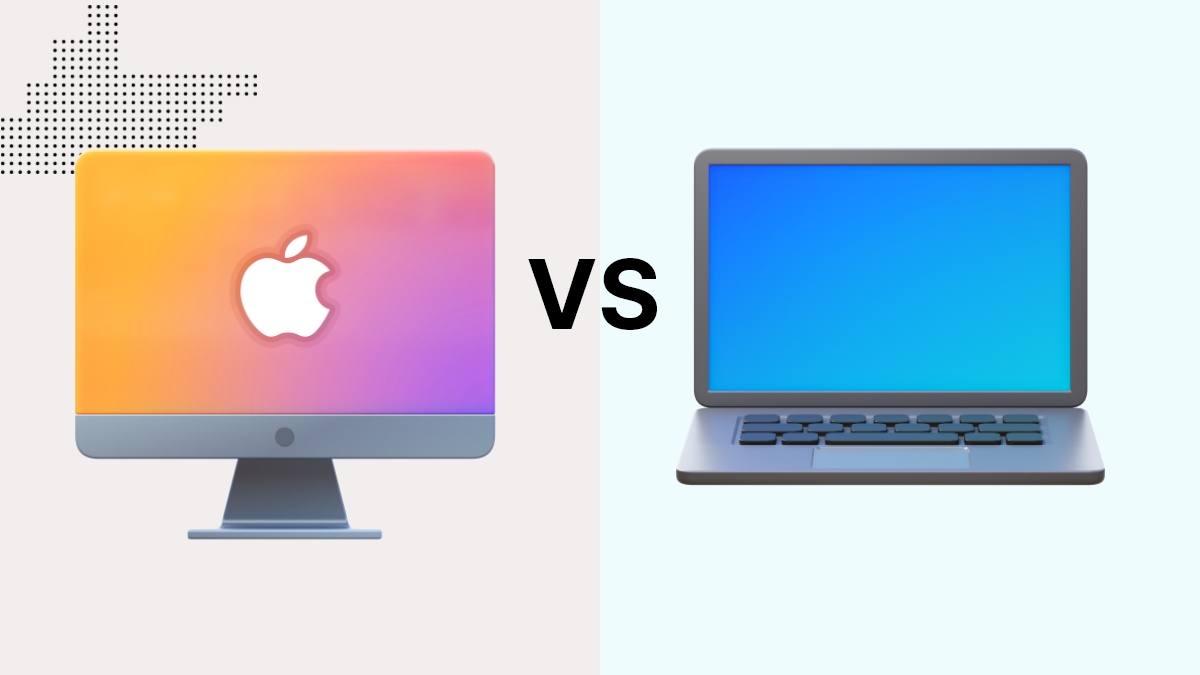A desktop vs. laptop comparison for college students. A laptop is no longer an option or a luxury for a college student; it is now a necessity as educational dependency on computer technology continues to expand.
As a college student, determining what you truly need between a desktop and a laptop, as well as selecting the best PC, is a huge decision.
College life can be stressful in general, so owning a laptop or desktop computer is a must-have for any college student.
Laptops and desktops, in actuality, work in the same way: they both provide you with a personal computer. However, depending on your field of study and how you intend to use your new computer, your requirements for any of them may differ.
Why do you need a laptop or desktop as a student?
A laptop or desktop computer is more of a necessity than a luxury for a college student. Here are some of the reasons you’ll need one:
For starters, a powerful computer is necessary for the ever-increasing trend of online classes, as well as for engaging with professors and students.
Second, you’ll need a laptop or desktop computer to complete all of the coursework and research assignments assigned to you in college.
You’ll also need a desktop or laptop to communicate with your friends and family. Several students leave home for the first time when they enter university.
You can make web communication much more personal by using ordinary built-in webcams and microphones.
What are the advantages of a laptop for college students?
Laptops provide students with the flexibility and convenience they require to complete school tasks at any point in time. A laptop makes it easy to take your work with you wherever you go.
In reality, the finest laptops for college students should last for at least four years of undergraduate study and possibly a year of graduate work.
Laptops are typically lightweight frames with full-size keyboards that wrap screens under 17 inches. The clamshell form makes it simple to open, close, and carry.
In addition, laptops have internal battery sources that allow users to continue using their PC even when they are not near a power outlet.
What are the advantages of a desktop for college students?
Many university video lovers and gamers will prefer a desktop because it allows them to enjoy a large-screen pleasure.
As a college student, you can also upgrade it over time to keep up with the latest technology.
As a college student, having a desktop with your TV shows and homework on it can be difficult, but it is also a great way to learn how to work under pressure.
Furthermore, most desktop computers come with plenty of storage; having one as a college student means you can store as many songs, movies, and games as you want.
Which do I really need as a college student?
When selecting whether to buy a desktop or a laptop computer as an undergraduate, you’ll have to weigh a few factors to see which one best suits your needs.
Despite the fact that most students prefer laptops, current desktop computers have a number of unique benefits that leave the discussion loose.
Here are some distinctions and criteria to consider when trying to make a selection in the Desktop vs. Laptop franchise:
- Size and Portability
- Cost
- Storage
- Screen size
- Power
- Maintenance
1. Size and Portability
In terms of size, laptops possess the most evident advantage over desktop computers. Laptops, unlike desktop computers, have smaller components, making them much more portable.
A laptop is essentially a fully intact computer with built-in monitors, keyboards, and a magic mouse that takes up significantly less space.
Desktops, in general, are huge and also have a distinct monitor. Although it is feasible to transport a desktop from one location to another, it is inconvenient and not the best option for portability.
This is due to the fact that they are built to be utilized in a specific spot and are rarely, if ever, transferred.
Laptops, on the other hand, are portable due to their small size. Their primary goal is to be moveable from one location to another in a backpack or laptop-carrying bag. They’re also perfect for use on the go.
2. Cost
Desktop components, such as monitors, keyboards, and mice, come in a wide range of configurations. These components enable a wide variety of pricing, but the reference point is affordable.
As a result, desktops may be purchased for as little as $400 for a whole package (computer and monitor) and yet provide a capable machine.
Laptops, on the other hand, can have a wider range of component possibilities than desktops, although they are still constrained.
As a result, a more powerful laptop (that is, one with a faster processor, better graphics, more storage capacity, and so on) might cost significantly more, ranging from $900 or more, based on the manufacturer.
3. Storage
Internal disks are commonly placed on desktop PCs. Laptop computers, on the other hand, usually only have room for one internal disk. If any extra internal storage is required, the drive must be totally replaced.
On their various data ports, desktops can also connect to several external disks (USB, Thunderbolt, and so on).
Laptops can connect to many external drives as well, but the number of ports on a laptop is limited compared to a desktop computer.
4. Screen Size
Desktop displays can also be connected to a television, allowing for screen sizes as large as a television. As a result, the desktop can be utilized for a variety of purposes and in a variety of environments.
Laptops are designed to be portable, which necessitates the use of smaller screens. Laptop screens typically range from 10 to 17 inches in size.
A laptop, on the other hand, may connect to an external display and accommodate any monitor, screen, or projector size if necessary.
5. Power
In general, desktops consume more energy than laptops. They must power a higher-wattage power source, as well as many computer components and a monitor. Any files that are being operated on but not saved can be erased if the power fluctuates or goes out.
Laptops, on the other hand, consume less energy than desktop computers. Because the components are smaller, less power is required to operate them.
Furthermore, laptops feature a battery, ensuring that unsaved work is not lost in the event of power interruptions.
6. Maintenance
Fixing a desktop is so much cheaper since most of the necessary hardware can be found on the shelves of any local computer store.
Opening a laptop to fix a part, on the other hand, can be tricky, and obtaining a replacement part generally necessitates calling the computer maker or ordering from a third-party website.
So, in terms of maintenance, it is actually easier to fix sections of a desktop than it is to fix parts of a laptop.



 Jobi.ng
Jobi.ng




